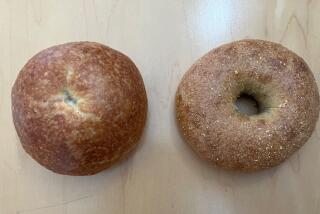My Hostess envy
In my childhood, Hostess snack foods loomed as the symbol of freedom. Freedom from the cruel health food regimen and ethnic dietary peculiarities of my keepers. Freedom to eat and dance and flirt and wear loafers and be cute and silly and utterly American.
While I trudged the three blocks to Zeman’s bakery for a loaf of salted and seeded rye wrapped in brown paper, I knew that happy, free girls were out there digging into plastic polka-dotted bags of Wonder Bread, selecting two perfect slices as soft as clouds. They would then roll the bread into white balls, or spread peanut butter and jelly on them. Even a single slice of baloney looked lovely and pure on Wonder Bread. These lucky girls didn’t even need teeth! They could eat using only their tongues against the roofs of their mouths.
Rye bread required not only teeth, and jaws, but determination. Rye bread was no laughing matter.
Sometimes the hair-netted lady at Zeman’s let me pick a treat from the cookie counter. I’d chose between prune and poppy-seed filling, contained in dough so dry it screamed for milk. Or sometimes, I’d opt for the round cookies with a small dab of red jelly in the center, which my dad called “bloody sores.”
These pastries did not giggle or float or bounce or look like happy coconut breasts. They had no cream filling or anything else soft and silly. The desserts of my childhood were level-headed and serious. The worldview of Hostess fun food hadn’t entered my parents’ consciousness, let alone their diet. Frozen peas, and a few other time-saving Sputnik foods, made it through our front door. But Twinkies? Never.
The girls at school who had Wonder Bread sandwiches and Hostess cupcakes in their lunches were the very same girls who didn’t have to wear heavy, clunking oxfords for their arch support. The TVs were on in their houses while they ate dinner, and they were allowed soda pop, pizza, potato chips and store-bought cake at their birthday parties. Their moms wore makeup and heels and nail polish, and their dads joked with us. And many of them got their hair cut by actual beauticians.
I envied every single thing about them, including that they didn’t seem to realize what amazing lives they had. They were entirely casual about having not just the occasional Twinkie as a super treat after hours of pleading, while facing brain surgery or because a dog had died. All they had to do was help themselves from boxes kept in their own kitchen cupboards and replenished every week!
So what happened to all those happy Hostess Twinkie and Ding Dong girls? Didn’t they grow and multiply, ensuring that ever more boxes of Ho Hos made it to shopping carts and kitchen cabinets? It doesn’t seem possible that in the battle of prune filling versus fluffy cream, the prune won. But why else would Hostess Brands be closing 36 plants and threatening to fire 18,500 bakery employees? Or be talking about chopping up the company and selling the treats piecemeal, the Twinkie recipe here, the Wonder Bread recipe there?
As a child, I assumed that the moment I was a free adult, doing my own grocery shopping, with my own money, I’d fill my cart and home with Hostess everything. But somewhere along the line I forgot to do so. And now, given the possible liquidation of the company, I realize I’ve probably missed my chance.
The news talks of unions and strikes and fiscal mismanagement, but perhaps the problem was that I wasn’t the only girl whose head was turned by more sophisticated pastries and possibilities. The Pepperidge Farm Milano, say, or even Trader Joe’s lemon tart.
Nonetheless, the potential loss of the Hostess Brand makes me melancholy for the kind of adulthood I’d intended to grow into, and for the little girl whose dreams of a Wonder Bread future never came true.
Amy Goldman Koss’ latest novel for teens is “The Not-So-Great Depression.”
More to Read
A cure for the common opinion
Get thought-provoking perspectives with our weekly newsletter.
You may occasionally receive promotional content from the Los Angeles Times.






